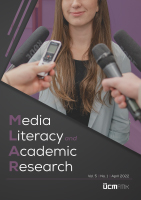Crossing Steam and Media Literacy at Preschool and Primary School Levels: Teacher Training, Workshop: Planning, its Implementation, Monitoring and Assessment
Crossing Steam and Media Literacy at Preschool and Primary School Levels: Teacher Training, Workshop: Planning, its Implementation, Monitoring and Assessment
Author(s): Vitor Tomé, Belinha S. De AbreuSubject(s): Social Sciences, Education, Psychology, Media studies, Communication studies, Preschool education, School education
Published by: Univerzita sv. Cyrila a Metoda v Trnave, Fakulta masmediálnej komunikácie
Keywords: Education; Media Literacy; In-Service Teacher Training; Pre-School Children; Primary School Children; STEAM;
Summary/Abstract: Seventeen workshops on STEAM and Media Literacy, involving 500 children aged 3-10, their families and other community members, in a pandemic context, was the end result of the third phase of the ‘Digital Citizenship Academy’. This community-based action research project began in early 2015, in a Lisbon neighbourhood of Portugal. The workshops were planned, implemented, monitored and assessed by 29 teachers during an online training initially planned to be developed on site. Despite the Covid-19 outbreak, teachers implemented strategies to overcome the lack of resources and autonomy of many students, especially younger ones, and the training focus remained on the production of scientific, artistic, technological, but also media content. The workshops allowed the creation of media and STEAM products primarily focused on the arts, but in which science, technology, engineering and mathematics were present.Results point to the fact that STEAM projects gain in relevance when associated with Media Literacy activities, and vice versa. Although there is a general feeling that the situation resulting from the pandemic prevented the achievement of more significant results, the training course was suitable to pedagogical practices, provided an opportunity for sharing of experiences, practices and ideas, fostered cooperation and interdisciplinary, and resulted in useful resources.
Journal: Media Literacy and Academic Research
- Issue Year: 5/2022
- Issue No: 1
- Page Range: 161-177
- Page Count: 17
- Language: English

